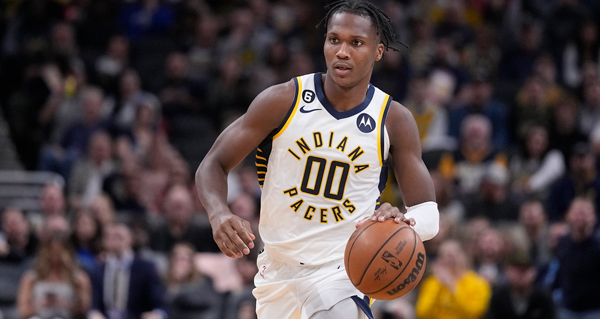Michigan big man Danny Wolf measured 6-foot-10.5 barefoot with a 7-foot-2 wingspan and 9-foot-1 standing reach at the NBA Draft Combine. However, while the 21-year-old has the measurables of a traditional NBA center, he doesn't fit the mold of a standard low-block big or rim-runner.
Wolf isn't some lumbering body that parks himself in the paint. He was Michigan's offensive engine in his lone season in Ann Arbor, serving as a playmaking giant who ran the break, operated pick-and-rolls as both handler and roller, and made passes that would make most guards envious. His game is all about flair and creativity, and it'll be interesting to see what he can accomplish at the next level. In the right situation, he should absolutely shine.
Wolf averaged 13.2 points, 9.7 rebounds, 3.6 assists, and 1.4 blocks per game last season, looking exactly the same as the star he was for Michigan as he did for Yale. That's a great sign as Wolf looks to prove he's starting-caliber NBA material. The jump in competition didn't faze him one bit.
Wolf is genuinely an anomaly in basketball. It's rare for a seven-footer to rebound the basketball, push it up the floor, and spot shooters and cutters with such ease. He has the vision to see over defenses and the confidence to thread the needle. He's one of the few bigs on the planet who can make wraparound passes in traffic or dish out of the short roll.
That's why Michigan head coach Dusty May was comfortable running so much of the Wolverines' offense through him—and there's a real chance his next coach will do the same. Perhaps Wolf won't immediately be an offensive hub in the NBA, but it isn't hard to see him playing a role similar to Kelly Olynyk off the bench. Injuries have derailed Olynyk's career somewhat, but he was an excellent second-unit distributor as both power forward and center—and a productive starter in certain situations.
Another player who comes to mind as a comparison for Wolf is Greg Monroe. Both Wolf and Monroe had college seasons in which they posted a defensive rebound rate of 25% or higher, an assist rate of 22% or higher, and a block rate of 4% or higher. Monroe had a productive NBA career that earned him north of $77 million, and Wolf's footspeed is better than Monroe's ever was, so the 21-year-old should be less of a liability on defense.
Offensively, the only real question mark with Wolf is his jumper. How reliable will he be as a floor spacer? Wolf shot 33.6% from three-point range at Michigan last season, which isn't bad for a player his size. However, he also shot just 59.4% from the free-throw line—a surprising number considering how confident he looks as a shooter.
Was that just a fluke? Wolf did shoot 71.7% from the line in his final season at Yale, and he also shot well at the NBA Draft Combine. In the spot-up shooting drill, he went 19-for-25 on threes and 9-for-10 from the free-throw line. While his shooting mechanics feature a somewhat slow wind-up, they aren't fundamentally flawed. Plus, a slow release isn't a death sentence for a big man, as he should have plenty of time to set his feet and fire when defenses don't prioritize contesting his shots.
If Wolf does develop into a decent catch-and-shoot threat at the NBA level, he's going to be an impactful scorer—even if that's not the primary reason he's on the court. A triple or two per game, combined with what he can do as a driver and back-to-the-basket scorer, will make him a tough cover—especially when factoring in his playmaking ability.
Wolf just needs to ensure he doesn't stand out for the wrong reasons on the defensive end. He has quicker feet than you'd expect for a "non-athlete," which helps him maneuver around the court effectively. That footspeed allowed him to play respectable defense at the college level, but he did struggle to guard quicker forwards and occasionally got bullied by stronger bigs.
Wolf is going to need significant work on his body; getting quicker and adding muscle will be crucial for his NBA development. He'll never be an elite rim protector in the NBA and would be fortunate to develop into a decent overall defender. However, he works hard to contest shots and is disciplined about going vertical without fouling. That approach will go a long way toward helping him earn a spot in an NBA rotation.
More generally, he works hard not to be a liability and is usually positioned correctly. If he's not asked to do too much defensively—or can be hidden on a weaker offensive player—he should be able to hold his own.
Don't let anybody tell you Wolf has the potential to be the next Nikola Jokic—even though that's the comparison everybody wants to make when they see a big man with this kind of skill set. But Wolf is one of the more unique prospects in this draft class, and he has real upside for a franchise willing to bet on his blend of size and basketball IQ. The thought of him landing in a situation where he's asked to facilitate for a team with a score-first primary option is genuinely exciting.






